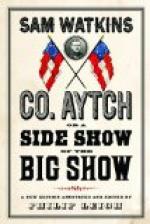She passed in, the door closed softly behind her, and she saw her lover lying in a large, chintz-covered arm-chair, full of cushions, deep like a feather bed. He held his book high, so that all the light of the electric lamp fell upon it, and the small, wrinkled face seemed to have suddenly grown older behind the spectacles, and the appearance at that moment was of a man just slipping over the years that divides middle from old age.
In the single second that elapsed before they spoke, Evelyn felt and understood a great deal. Never had Owen seemed so like himself; the old age which so visibly had laid its wrinkles and infirmities upon him was clearly his old age, and the old age of his fathers before him. He was in his own old room, planned and ordered by himself. Even his arm-chair seemed characteristic of him. With whatever hardships he might put up in the hunting field or the deer forest, he believed in the deepest arm-chair that upholstery could stuff when he came home. In this room were his personal pictures, those he had bought himself. They, of course, included a beautiful woman by Gainsborough, and a pellucid evening sky, with a group of pensive trees, by Corot. There were beautiful painted tables and chairs, and marble and ormolu clocks, the refined and gracious designs of the best periods; and the sight of Owen sitting amid all these attempts to capture happiness, revealed to her the moral idea of which this man was but a symbol; and the thought that life without a moral purpose is but a passing spectre, and that our immortality lies in our religious life, occurred to her again. His first remark, too, about his gout, that it wasn’t much, but just enough to make life a curse—could she tell him what end was served by torturing us in this way?—laid, as it were, an accent upon the thoughts of him that were passing in her mind.
It was that crouching attitude in the arm-chair that had made him seem so old. Now that he had taken off his spectacles, and was standing up, he did not look older than his age. He wore a silk shirt and a black velvet smoking suit, and had kept his figure—it still went in at the waist. She admired him for a moment and then pitied him, for he limped painfully and pulled over one of his own chairs for her. But she declined it, choosing a less comfortable one, feeling that she must sit straight up if she were to moralise. She had imagined that the subject would introduce itself in the course of conversation, and that it would develop imperceptibly. She had imagined that they would speak of the first performance of “Tristan and Isolde,” now distant but a couple of days, or of Lady Ascott’s ball, at which she had promised to appear. But Owen had spoken of a song which he had re-written that afternoon, not having anything else to do. He believed he had immensely improved it, and wished that she would try it over. To sing one of his songs, to decipher manuscript, was the last thing she felt she could do, and the proposal irritated her. Her whole life was at stake; it had cost her a great deal to come to the decision that she must either marry him or send him away. Partly on purpose, and partly because she could not help it, her face assumed a calm and fixed expression which he knew well.




